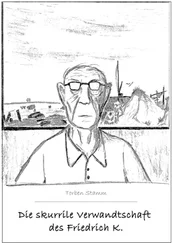For the next few days, Sara practiced more than ever. Sometimes she played the same few bars over and over again for an hour, until her fingers hurt. On Thursday the man from the orchestra called. Once again she missed his name, and didn’t trust herself to ask. He was short with her, and said that the conductor could fit her in tomorrow after rehearsals, at half past twelve, and she should try to be punctual.
That afternoon she played through the whole concerto. For the first time she noticed that her playing was entirely lacking in brilliance and expression. She needed all her strength and concentration to master the technical difficulties, and even then she wasn’t successful. She made mistakes, many mistakes. How deluded she had been for all those years. Even when she’d been a conservatory student she hadn’t been allowed to take the concert diploma, because she hadn’t been good enough, and she hadn’t got any better since. Perhaps the swimming coach was right, and talent didn’t matter, but nor did she have sufficient enthusiasm to carry her through, the energy, the thing he’d called the winning instinct.
Left to herself, Sara wouldn’t have turned up to the audition at all, but she couldn’t do that to Victor. Perhaps she was too self-critical. That too was part of the makeup of a proper artist, that restlessness, that dissatisfaction. In the evening she drank a couple of glasses of wine, and suddenly she felt confident again.
SARA WAS AT THE CONCERT HALL far too early. The side entrance was locked, so she waited outside the front door. Even though it was a cool day, she was wearing a skirt. She had spent a long time thinking about what to wear, she had even briefly pulled out the rather garish dress she had worn to her sister’s wedding. In the end she settled on a knee-length tartan wraparound skirt paired with a cream silk blouse. She felt cold and clenched her hands, which were slowly turning clammy. At last the door opened and a mob of chatting, laughing musicians came pouring out, some of them with instrument cases. Sara recognized an oboist who was her contemporary at the conservatory, but the woman ignored her greeting. Sara walked into the lobby, where a few musicians stood around and looked at her.
She recognized the conductor at once, even though he was in a cardigan and some baggy old cords. He walked very confidently toward her and held out his hand, without saying his name. Sara was amazed by his youthful appearance, he seemed younger than she was. He led her to the soloists’ room, a small space that, apart from a grand piano and a music stand, contained only a small side table and a hideous black-and-white designer couch that reminded her of the chair at the gynecologist’s. The blinds were down and two neon tubes spread a cool, diffuse light.
The conductor sat down on the couch and stretched his legs; the attitude had something a little obscene about it. While Sara took the score from her bag and adjusted the piano stool, he asked her what sort of piano she played at home. Just an upright, said Sara. Better a good upright than a poor grand, said the conductor. What was the last concert you’ve been to? Sara thought about it. She had heard Britten’s Ceremony of Carols , but that was years ago. I don’t get to listen to as many concerts as I’d like, she said, I have to teach on some of my evenings. The conductor furrowed his brow and asked what her connection to Victor was. He takes lessons from me, she said, has done for years. We’re friends. I’m sure I don’t need to tell you how extremely grateful we are to his company for their generous support, said the conductor, but of course that mustn’t play any part in the decision here … Well, whenever you’re ready. He looked at his watch.
IT WENT BETTER than I expected, said Sara.
And what did he say? asked Victor. The phone connection was poor, his words sounded chopped up and kept being interrupted by brief moments of stillness.
He said he would be in touch, said Sara, and then, louder, He’ll be in touch, he said.
I can hardly hear you, said Victor, but we’ll see each other in another week. Bye.
Sara hadn’t managed to tell Victor the truth. That the conductor had ended the audition after a few minutes by saying there was no point. He had walked up to the piano, taken her score, and flipped through it, as though to check for himself what she had been playing. Then he passed it back to her and gave a little lecture on Rachmaninoff, whom he called the last romantic. His kindliness and patience with her were perhaps the most hurtful of all; he talked to her as to a child that needed to be comforted. He said she had picked an extremely difficult piece, which was simply beyond her. She ought to try something simpler. And as far as public performances went, he could imagine that an old age home or care facility would provide a grateful public. Though best steer clear of Rachmaninoff, he added, laughing, otherwise all the old folks will get coronaries. Sara smiled dutifully and allowed the conductor to usher her to the door and wish her all the best.
At home she sat at the piano for certainly an hour, shaken with crying jags, until her throat felt sore. She drank a glass of tap water in the kitchen. She dropped the score in the recycling.
TEN DAYS LATER Victor came for his lesson. Sara said the audition hadn’t worked out. He seemed to sense that she didn’t want to talk about it, and started speaking of his holidays. When the lesson was over, they sat in her kitchen, and Victor showed her his holiday snaps of Madeira. They had to put their heads together to make out anything on the little display of his digital camera. Victor had laid his arm around Sara’s shoulder. And did you have your holiday fling? she asked. He moved away, looked at her in surprise, and asked, How can you think of something like that? So you did. Look, he said, I have my life and you have yours. We may be friends, but that doesn’t mean I have to tell you everything. Sara could feel the tears running down her cheeks. You’re so obtuse, she said, you’re so bloody obtuse. Victor stroked her shoulders and talked soothingly to her, but she stood up and coldly told him to go. Find some other woman you can exploit. He tried to placate her, but it only made matters worse.
After he had gone, Sara remained sitting at the piano for a while. She struck a couple of notes at random, but they sounded wrong, and no tune was forthcoming. Finally, she pushed the piano stool back against the wall, climbed up on it, and carefully started to unpick the raffia knots that held up the philodendron. It took a long time before she had undone every one, and the plant was a crumpled heap next to the piano. When she cut it into little pieces with her pruning shears, she felt like a murderess, but after she had stuffed it into garbage bags and stood them on the edge of the sidewalk, she felt oddly relieved.
NO SOONER DOES Hermann put the list down on the unmade bed than he picks it up again. He has already forgotten everything on it. Toiletries. He goes to the bathroom and gathers up Rosmarie’s things: the olive oil soap she bought last year in the south of France, her hairbrush, toothbrush and toothpaste, her deodorant. He’s not sure which of the many shampoos is current, and packs one, hoping it’s the right one. What else? Nail scissors. He puts back the nail polish, after briefly hesitating. He goes into the bedroom, pulls the small suitcase down from the top of the wardrobe, and puts the sponge bag in it. Then he checks the list again. Several changes of underwear. He stands in front of the open wardrobe, roots around in Rosmarie’s underthings, fluffy tangles of white that remind him of peony blossoms in the garden. He has the feeling he is doing something inappropriate. How many do they want? He doesn’t know how long Rosmarie will be kept in for, he’ll be glad if she’s allowed back at all. Pajamas or nightie. He prowls through the apartment looking for her slippers. Then he remembers seeing them when Rosmarie was on the stretcher, being carried out by the paramedics. They were on her feet like two hooks. He had even wondered for a moment about maybe putting her shoes on. She wouldn’t even have gone out to the mailbox in her slippers. Stout trainers, in case physiotherapy is indicated. He doesn’t know what the doctors have in mind for Rosmarie. The very notion of her in trainers makes him smile in spite of himself. For the moment, there’s little prospect of such therapy. The doctors have put her in an artificial coma and cooled her temperature down to a constant ninety-two degrees. They’re refrigerating her, he keeps thinking.
Читать дальше







![Brian Jacques - [Flying Dutchman 01] - Castaways of the Flying Dutchman](/books/128851/brian-jacques-flying-dutchman-01-thumb.webp)




